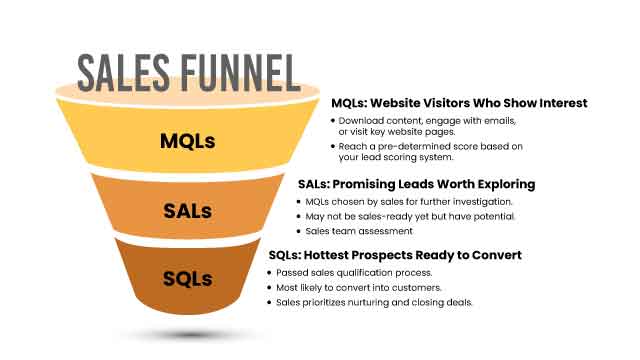
Ah, the never-ending quest for qualified leads! B2B marketers spend countless hours crafting campaigns, social media posts, and targeted ads, all in the name of capturing potential customers.
But what happens after that initial spark of interest? Do all those website visitors and content downloads translate into sales conversations? Let’s delve into the enigmatic world of SQL’s and SAL’s.
Must Read: MQL vs SQL: Which Lead Matter More & When?
Understanding the Stages: MQLs, SALs, and SQLs
Table of Contents
- 1 Understanding the Stages: MQLs, SALs, and SQLs
- 2 Challenges and Solutions: Optimizing the Funnel Journey
- 3 The Importance of Collaboration: Marketing & Sales Working Together
- 4 How Acme Inc. Transformed Stagnant Pipeline into a Smooth-flowing Funnel
- 5 FAQs: Addressing Challenges with SQLs and SALs
- 5.1 Q.1: We’re overwhelmed by the volume of leads our marketing generates, but sales say they’re not qualified. How can we improve lead quality?
- 5.2 Q.2: Our sales team complains that marketing isn’t generating enough leads. What can we do?
- 5.3 Q.3: How can we ensure a smooth handover between marketing and sales when passing on SQLs?
- 5.4 Q.4: Is marketing automation a good fit for managing SQLs and SALs?
- 5.5 Q.5: What metrics should we track to measure the success of our SQL and SAL strategy?
- 5.6 Share this:
Sales Qualified Leads (SQLs) and Sales Accepted Leads (SALs) might sound similar, understanding the distinctions between these lead types is crucial to boosting up your marketing funnel.
Imagine your sales funnel as a pyramid. Marketing casts a wide net at the top, attracting potential customers. As leads express interest and demonstrate fit with your ideal customer profile (ICP), they progress down the funnel through lead qualification.
Must Read: MQL to SQL Conversion Rate
Leads can be classified into 3 types:
- Marketing Qualified Leads (MQLs): These leads have shown interest through website visits, content downloads, or email engagement. They’ve reached a pre-determined score based on your lead scoring system.
- Sales Accepted Leads (SALs): MQLs that the sales team agrees to investigate further. They may not be sales-ready yet, but the sales team sees potential. Qualification involves calls, needs assessments, or demos to assess budget, authority, timeline, and pain points.
- Sales Qualified Leads (SQLs): Leads who successfully pass the sales team’s qualification process. These are your hottest prospects, most likely to convert into customers. The sales team can now prioritize efforts on nurturing these leads and closing deals.
Challenges and Solutions: Optimizing the Funnel Journey

While the importance of SQLs and SALs is clear, navigating the process isn’t without its hurdles. Here’s a breakdown of common challenges and solutions to keep your funnel flowing smoothly:
Alignment Between Sales and Marketing:
According to Forrester Research, 73% of B2B businesses report challenges aligning marketing and sales on lead qualification.
These stats underscore the importance that both marketing and sales teams agree on the definition and criteria for SQLs and SALs. And without clear definitions, leads might fall through the cracks, or unqualified leads could waste valuable sales time.
Solution:
- Foster regular communication between marketing and sales leadership.
- Establish Service Level Agreements (SLAs) that outline the characteristics of an MQL, SAL, and SQL.
- Prepare lead scoring models and qualification criteria to ensure a smooth lead handoff.
Generating High-Quality Leads:
Sirius Decisions research indicates that only 25% of leads are actually qualified.
Attracting qualified leads who are a good fit for your product or service is an ongoing challenge. Marketing efforts might be attracting a broad audience that isn’t sales ready.
Solution:
- Refine your buyer personas and tailor your marketing content to their specific needs and pain points.
- Utilize targeted advertising platforms to reach the right audience. Offer gated content like white papers or webinars to capture leads who are actively researching solutions.
- Track the source of your leads to identify which marketing channels are generating the most qualified prospects.
Must Read: Lead Nurturing Strategies for MQL
The Importance of Collaboration: Marketing & Sales Working Together
The key takeaway here is that SQLs and SALs represent different stages in a collaborative process. Marketing identifies promising leads through nurturing and qualification, passing the baton to the sales team when an SAL emerges.
Clear communication and established criteria for both MQLs and SALs ensure a smooth handoff and efficient use of resources.
Marketing automation platforms can be invaluable tools for lead nurturing and qualification. By automating tasks like email workflows, lead scoring, and data analysis, these platforms free up valuable time for both marketing and sales teams.
Must Read: How to Generate MQLs
How Acme Inc. Transformed Stagnant Pipeline into a Smooth-flowing Funnel
Acme Inc., a once-prominent cloud storage provider, was facing a harsh reality. Their sales pipeline had become a stagnant swamp. Leads trickled in, but conversions remained stubbornly low. The culprit? A fundamental misunderstanding of the customer journey and a flawed approach to lead qualification.
Acme Inc., a cloud storage provider, watched its sales pipeline dry up. Their “spray and pray” marketing strategy generated a flood of unqualified leads, overwhelming sales and yielding dismal conversions.
A consultant’s intervention proved lifesaving. SQLs and SALs became the bridge between marketing and sales. Marketing honed its focus, attracting leads with genuine interest. Sales, armed with qualified prospects, thrived. The stagnant pipeline transformed into a smooth-flowing funnel, delivering consistent growth. Acme learned: quality over quantity is the key to a winning sales strategy.
The once-stagnant sales pipeline transformed into a smooth-flowing funnel, consistently delivering new customers.
Acme’s story is a testament to the power of understanding the customer journey and the importance of effective lead qualification. By embracing SQLs and SALs, they bridged the gap between marketing and sales, ultimately achieving sustainable growth.
In conclusion, understanding the journey from MQL to SQL is key to a thriving B2B sales funnel. By aligning marketing and sales on lead definitions, prioritizing lead scoring, and leveraging marketing automation, you can ensure a steady stream of qualified B2B leads. Implement these practices and, like Acme Inc., you can transform your lead qualification process into a powerful engine for B2B sales growth.
Read the FAQ section below for a deeper dive into mastering SQLs and SALs for B2B sales success.
Must Read: What is Sales Qualified Leads
FAQs: Addressing Challenges with SQLs and SALs
Q.1: We’re overwhelmed by the volume of leads our marketing generates, but sales say they’re not qualified. How can we improve lead quality?
Answer: Focus on lead nurturing: Develop lead nurturing campaigns that educate leads about your product or service, helping them progress through the buyer’s journey. This equips them with the knowledge to have meaningful conversations with sales when they’re ready.
Q.2: Our sales team complains that marketing isn’t generating enough leads. What can we do?
Answer: Align marketing goals with sales goals: Ensure marketing efforts are geared towards attracting leads that align with your ideal customer profile (ICP) and fit your sales team’s needs.
Q.3: How can we ensure a smooth handover between marketing and sales when passing on SQLs?
Answer: Develop a clear handoff process: Establish a defined handoff process that includes detailed information about each SQL, such as their pain points, budget, and decision-making authority. This equips the sales team to effectively connect with qualified leads and move them further down the sales funnel.
Q.4: Is marketing automation a good fit for managing SQLs and SALs?
Answer: Marketing automation can be a powerful tool: It streamlines lead nurturing, automates lead scoring, and facilitates communication between marketing and sales. By automating repetitive tasks, marketing automation frees up time for both teams to focus on strategic initiatives.
Q.5: What metrics should we track to measure the success of our SQL and SAL strategy?
Answer: Track key performance indicators (KPIs): Go beyond vanity metrics like website traffic. Focus on metrics that measure progress through the sales funnel, such as lead conversion rates, sales cycle length, and customer acquisition cost (CAC).
Ready to take your B2B sales funnel to the next level? Explore how Only B2B can help. We
offer a comprehensive suite of B2B lead generation services designed to attract qualified leads
and fuel your sales pipeline. Visit our website to learn more!

Vikas Bhatt is the Co-Founder of ONLY B2B, a premium B2B lead generation company that specializes in helping businesses achieve their growth objectives through targeted marketing & sales campaigns. With 10+ years of experience in the industry, Vikas has a deep understanding of the challenges faced by businesses today and has developed a unique approach to lead generation that has helped clients across a range of industries around the globe. As a thought leader in the B2B marketing community, ONLY B2B specializes in demand generation, content syndication, database services and more.

.webp)
